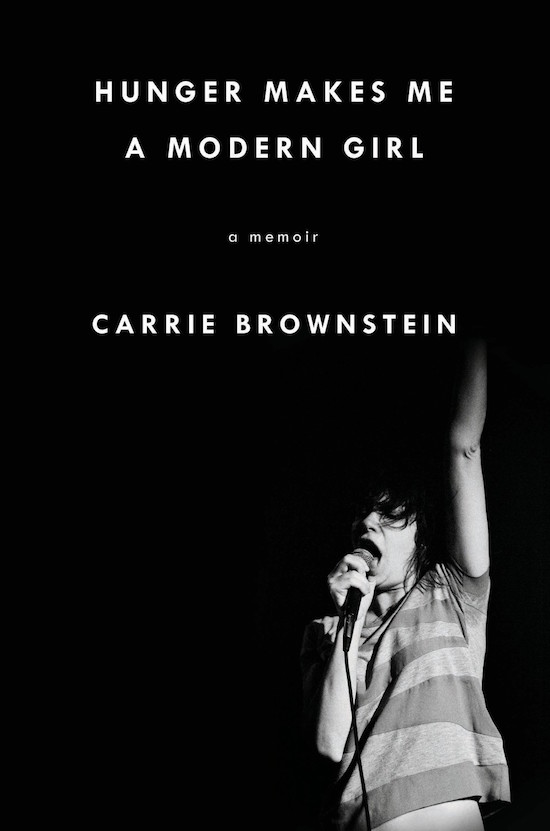Carrie Brownstein has always found beauty in tension. The barbed wire songs she weaves with Sleater-Kinney are in constant conflict and conversation with themselves. Guitars and voices coil around and clash into one another, careening off on their own paths, cohering almost in spite of themselves. In Hunger Makes Me A Modern Girl, a naked and often brutal memoir, Brownstein is as aware of this as any critic or fan. "A single sonic sound with two guitars," she says of her and co-frontwoman Corin Tucker’s musical style in the band. "Together we felt bold enough to be amplified."
But here, with no collaborators to either push or ground her, she is alone in reconstructing her narrative, left with nothing to wrap herself around, nothing to converse with besides fragments of her past selves. After two decades of collaboration, Brownstein now lays out an existence that forked off from a persona constructed in adolescence. This is, she says, "a story of the ways I created a territory, something more than just an archipelago of identities, something that could steady me…"
That ‘something’ was built around punk, but, like her band and the Riot Grrrl scene that it grew from, …Modern Girl actively works against tired rock clichés (so prevalent in the memoir format). Her physical breakdowns were not the result of well-worn romantic notions of addiction or hedonism, but allergies: "These are not the afflictions of rock bands or guitarists. ‘Hives’ doesn’t really have the same ring to it as, say, ‘heroin’ and it falls far short of legendary potential." She makes sure to say that the band had no groupies on tour, although “I wish we had, just so I instead could have written, ‘Yes, of course we had groupies! Endless, countless numbers of groupies. A cornucopia of groupies, groupies coming out of my ears, groupies for days.’”
Instead, Brownstein was – and still is – a devoted fan. As an adolescent, she had transcendent experiences watching pop acts like Madonna live, after which there was "light everywhere I looked." She built her personality and aesthetic around Olympia’s thriving early-90s indie scene and saw club bands and early Riot Grrrls as deities. "I wanted to be someone who had that power to drift in and out of people’s imaginations," she writes, "who could be bigger than mere human form, a surface upon which others could project their longings." There is no fake swagger or shame here. Brownstein formed a band and created an identity in order to be loved.
Creating that identity was a form of escape, too: from a repressed and troubled home, an anorexic mother, a closeted father. She details these early experiences in terrifying clarity and her descriptions of her mother through her illness, in particular, are visceral. Here is a woman "dipped in cherry Kool-Aid, bags of white pus forming on her sternum, bones for days." Brownstein’s eloquence is still laced with pain.
Around these grim snapshots, the most revelatory and disquieting aspect is Brownstein’s perpetual self-criticism. She analyses her behaviour as a teenager, visiting clinics at which her mother would attempt to recover, and cringes at the thought that she used to overcompensate or portray herself as normal in spite of the obviously disturbing situation. She was barely a teenager at the time. An adolescent in such a situation might be forgiven.
This self-laceration finds its way into almost every nook of Modern Girl: sexual experiences, intra-band relationships, destructive meetings with major labels, on-stage costume choices. Often it’s done with humor and wit, other times it feels like a deeper cut. Either way, Brownstein takes herself to task constantly. When she discusses Sleater-Kinney’s records – and she does consider each one in order – she takes time to look at them like a critic. She heaps praise on Tucker and drummer Janet Weiss, but rarely speaks of her own qualities. At times, it seems, she still feels like an interloper, the kid by the side of the stage at the club, staring up at the punks she wants to be. She acknowledges that she inspires the same awe as the artists that she idolized in her teens – and she certainly knows that her readership here reveres her – but she doesn’t seem to fully comprehend why.
That Brownstein is an exquisite writer should come as no surprise – her prose is barbed and graceful, witty and melancholy, often all on one page. The tone is often the same one that seeps through the speakers on Sleater-Kinney’s records. But in the studio and on stage, she uses self-reflection as a dialectical tool, brushing against her bandmates’ polemics or confounding an audience’s expectations. Much of …Modern Girl‘s exquisite and ferocious power comes from the absence of those outside forces. In the memoir format, for an artist as deft and humble as Brownstein, confession – perhaps even self-destruction – is the only option.
On first glance, Hunger Makes Me A Modern Girl seems like such an apt name for a memoir by a woman who constantly pushed back on what was expected of her, formed one of the greatest rock groups of all time, turned herself into an icon, joyously tore up boundaries at every opportunity. But ‘Modern Girl’, the song from which the title is lifted, remains her band’s most sardonic, even vitriolic, cut. It assumes a persona at breaking point to demonstrate the thin veil of happiness associated with ambition and normality. "My whole life looks like a picture of a sunny day," Brownstein repeatedly spits over a bright, descending guitar in the song’s chorus, backed by Tucker’s rising vocals and Weiss’ wailing harmonica.
Here, alone, Brownstein pulls back that thin veil further still.
*
Hunger Makes Me A Modern Girl is out now, published by Virago



